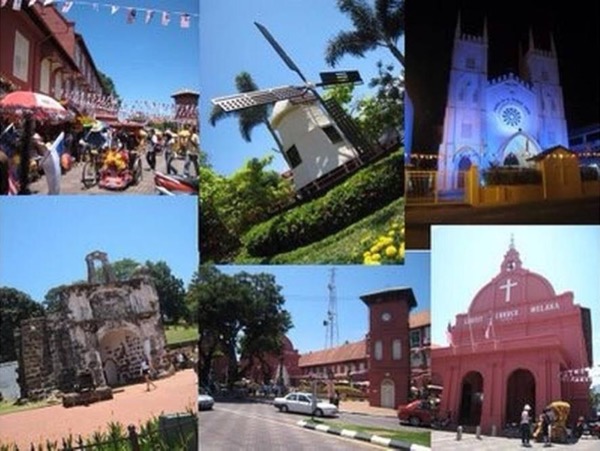Why Malacca?
Once one of the richest ports on the mythical Spice Route, Malacca boasts a colourful 600- year history spanning Malay sultans, Arab and Indian Muslim traders, Chinese settlers, and periods of Portuguese, Dutch and British colonial rule. After Malaysia’s independence, Malacca became a sleepy backwater, an insider’s address for rare antiques and delicious Nyonya cuisine created by the mixed-marriages of Chinese and Malays known as Peranakans. All of this changed when Unesco recognised this unique destination as a World Heritage Site, and today it’s a must-see trip for visitors to Singapore and Kuala Lumpur. Avoid the weekends to miss the crowds and enjoy lower hotel rates, but take the time to stay a couple of days to really discover this charming city.
A comfortable bed
For the perfect location, book Casa del Rio (
www.casadelrio-melaka.com), a plush resort with rooftop infinity pool overlooking the Malacca River. Double rooms cost from 510 Malaysian ringgit (Dh423).
The Majestic Malacca (
www.majesticmalacca.com) offers an irresistible combination of heritage grandeur with its sumptuous restaurant and tea salon in a charming 1920s villa, while luxurious rooms with grand, freestanding baths are housed in a modern wing. Double cost from 626 ringgit (Dh520).
ItLovers of boutique hotels in restored mansions are spoilt for choice here. 1825 Gallery Hotel (www.1825galleryhotel.com) contrasts hip decor inside a restored flour storehouse. Doubles cost from 136 ringgit (Dh113).
The traditional, 200 year-old Hotel Puri (
www.hotelpuri.com) is a maze of lush plant-filled courtyards and lavish salons. Doubles cost from 188 ringgit (Dh156).
Find your feet
Malacca’s centre should be discovered on foot. Hidden away in the narrow back lanes running between Jonker Street and Heeren Street is the sublime Masjid Kampung Kling, a Javanese -style mosque dating from 1748, while almost next door is the even older, incense-filled Cheng Hung Temple, built in 1645.
If the sweltering tropical heat is too much, jump on breezy boat ride along the winding Malacca River (15 ringgit [Dh12]), or for the brave, take one of the hundreds of incredibly decorated trishaws that crowd the central Red Square, ready to whisk off visitors on a frenetic city tour (25 ringgit [Dh21]), accompanied by blasting Bollywood music. The square is dominated by the brightly painted Stadthuys, the old Dutch town hall, which today houses the fascinating Ethnography Museum, and a tour of its extensive collection is the perfect introduction to Malacca’s complex history.
Meet the locals
The banks of the Malacca River are lined with casual cafes and bars, where locals take lazy sunset strolls. In the middle of Jonker Street, the lively Geographer Cafe attracts all ages, from pensioners having "teh tarik" aired tea in the morning, to students hanging out in the afternoon, and a funkier crown at night, when there’s often live music. On a Sunday morning, the side street outside is transformed into a packed flea market.
Book a table
For fine dining, reserve at the Majestic hotel’s elegant Melba at the Mansion, where local celebrity chef Melba Nunis cooks delicious Kristang dishes such as kari pimente (aubergine, fish and pepper curry; 75 ringgit [Dh62]), drawing on the unique fusion of Portuguese, Indian, Malay and Chinese influences.
For a more informal, outdoor feast of this spicy cuisine, get a cab to the heritage Portuguese settlement down by the waterside. Ignore the crowding touts and book first at De Costa, which serves incredibly fresh baked crab and steamed fish (main dish 30 ringgit [Dh25]).
Wild Coriander (Jalan Kampung Pantai) is a casual new locale specialising in Malacca’s famous Nyonya cooking, perfect to try spicy sambal prawns with pungent petai beans (15 ringgit [Dh12]).
Seeds Garden (Jalan Tokong) is a funky wellness vegan canteen that wouldn’t look out of place in Barcelona or New York. Tasty street food is also on every street corner, from satay to chicken rice balls.
Shopper’s paradise
Malacca is a paradise for antiques, with Aladdin’s cave boutiques such as Abdul Antiques (Jalan Hang Jebat) and Malaqa House (Jalan Tun Tan Cheng Lock) filled with ornate lacquered furniture, precious Chinese porcelain and rare ivory-topped Malacca canes.
Fashionistas should track down Wah Aik (Jalan Tun Tan Cheng Lock), an artisan cobbler making exquisite beaded sandals, while you can’t miss the brightly painted facade of The Orangutan House (Lorong Hang Jebat), a gallery showcasing local artist Charles Cham’s eye-catching paintings.
Don’t miss
A glimpse of the opulent lifestyle of Malacca’s Peranakan community, showcased in the Baba & Nyonya Heritage Museum (
www.babanyonyamuseum.com).
What to avoid
The weekend Jonker Walk Night Market gets horrifically crowded, with stalls selling tacky fast food and souvenirs.
Getting there
Return flights with Emirates (
www.emirates.com) or Etihad (
www.etihad.com) from the UAE to Kuala Lumpur cost from Dh1,890. From there, take a cab (250 ringgit [Dh207]) or Transnasional coach (
www.transnasional.com.my; one way 25 ringgit [Dh21]) for the 90-minute journey to Malacca.







